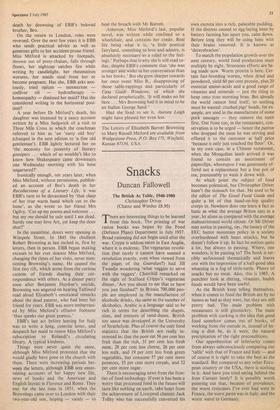Snacks
Duncan Fallowell
The British At Table, 1940-1980 Christopher Driver (Chatto and Windus £8.95)
There are interesting things to be learned from this book. The printing of war ration books was begun by the Food (Defence Plans) Department in July 1937. Bread rationing did not begin until after the war. Coypu is seldom eaten in East Anglia, where it is endemic. The vegetarian revolu- tion (but surely it 'cannot have seemed a revolution exactly, even when viewed from the pages of the Guardian?) had Jill Tweedie wondering 'what veggies to serve with the veggies'. Churchill remarked on the sight of Stafford Cripps's vegetarian dinner,. `Are you about to eat that or have you just finished?' In Britain 700,000 peo- ple are employed in the manufacture of alcoholic drinks, the same as the number of alcoholics. Arabic is a language said to be rich in terms for describing the shapes, sizes, and textures of sand-dunes. British soy sauce was developed at the University of Strathclyde. Plus of course the only food statistics that the British are really in- terested in: that the poor eat 56 per cent less fruit than the rich, 31 per cent less fresh meat, 28 per cent less cheese, 26 per cent less milk, and 19 per, cent less fresh green vegetables, but consume 57 per cent more potatoes, 33 per cent more cereals, and 32 per cent more sugar.
There is encouraging news from the fron- tier of food technology. If ever it has been a worry that processed food in the future will taste like nothing on earth, take heart from the achievement of Liverpool chemist Jack Tolley who has successfully converted his own excreta into a rich, palatable pudding. If the distress caused to egg-laying hens by battery farming has upset you, calm down. Before long they will be using hens with their brains removed. It is known as `decerebration'.
To match the population growth over the next century, world food production must multiply by eight. Strenuous efforts are be- ing made now. Worm protein is here. Cer- tain fast-breeding worms, when dried and powdered, yield 60 per cent protein, plus 20 essential amino-acids and a good range of vitamins and minerals — just the thing to heap onto yOur morning bran. But already the world cannot feed itself, so nothing must be wasted: crushed pigs' heads, for ex- ample, are used in the manufacture of some pork sausages — they remove the teeth first. Out front too, in the restaurants, con- servation is to be urged — hence the patron who dropped the meat he was serving and offered it to the customer at half price `because it only just touched the floor'. Or, in my own case, in a Chinese restaurant, when the Mongolian lamb arrived it was found to contain an assortment of paperclips, whereupon I was generously of- fered not a replacement but a free pot of tea, presumably to wash it down with.
At which point the subject of food becomes polemical, but Christopher Driver hasn't the stomach for that. He used to be the editor of The Good Food Guide and quite a bit of that hand-on-hip quality creeps in. Nowhere does one learn a fact as basic as what the average Briton eats in a year, let alone as compared with the average malnutritioned world citizen. Or Mr Driver may notice in passing, say, the lunacy of the EEC butter mountain policy in a society overburdened with heart attacks, but he doesn't follow it up. In fact he notices quite a lot, but always in passing. Where, one wonders, is he passing to? The book is ter- ribly unfocussed thematically and leaves one with the impression of a half-good idea wheezing in a fog of tittle-tattle. Plenty of snacks but no meat. Also, this is 1983. A punchier look at dieting, vitamins, health foods would have been useful.
As the British keep telling themselves, when it comes to food the British are by no means as bad as they were, but they are still pretty bad. The main problem with restaurants is still gimmickry. The main problem with cooking is the idea that good food somehow comes out of books, of working from the outside in, instead of let- ting a dish be, as it were, the natural precipitation of the right preconditions.
Our apprehension of inferiority comes from always subconsciously comparing our `table' with that of France and Italy — and of course it is right to take the best as the standard. But compared to any other Euro- pean country or the USA, there is nothing in it. And have you tried eating behind the Iron Curtain lately? It is possibly worth pointing out that, because of prevalence, the worst croissants I've ever had were in France, the worst pasta was in Italy, and the worst worst in Germany.






































 Previous page
Previous page